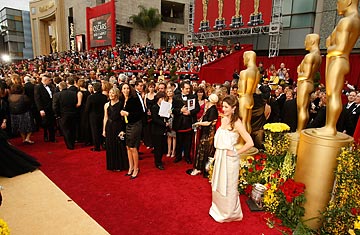
The scene of the 2009 Oscar red carpet
On Sunday afternoon in Hollywood, black limos will arrive one after another for the 82nd Academy Awards, their glamorous passengers spilling out into a rich and stunning celeb parade. It is so rich and stunning that mere mortals have to be corralled along a separate, parallel red carpet — and even these also-rans must be prodded along by security to avoid carpet gawkers' jam.
But like so many aspects of modern life, the red carpet industry away from Oscar Sunday is struggling to find its niche in a changing world marked by media fragmentation and oversaturation. Once an iconic symbol, the carpet has lost several shades of its crimson hue in a town that now sees about four red-carpet events a night. "It used to be a rare thing and people used to get excited about the red carpet, but now the mystique is gone," says Hollywood publicist Ben Russo, of EMC/Bowery, a player on the Hollywood party scene. "It's way too oversaturated. Now any mom and pop opening around here can and will have a red carpet."
The sheer numbers of carpets — West Hollywood even features a yogurt store with a full-time red carpet decoration near the toppings section — is just one of the problems facing the once regal red. A bigger issue is that the celebrity rules have changed, and these rules are being played out on the red carpet frontier.
Depending on how you look at it, celebrities either used to be treated with more respect and distance by the media, or their pr people held the then smaller media pool more accountable for their coverage. Either way, the carpet was a nicer place as little as four years ago. But in the days of paparazzi and entertainment blogger overrun, the red carpet provides less and less shelter.
Reality star and red-carpet opportunist Spencer Pratt recalls growing up in Los Angeles and watching Russell Crowe during 2000's Gladiator premiere. "I watched him go through several of his Australian beers on the carpet," Pratt recalls. "The media were all around him, it was just a different kind of media. They let people get away with more because the celebrities had more power. Now some paparazzo who has to pay his rent doesn't care what Russell Crowe or his agent thinks of him. He's taking that picture and selling it." And today, media outlets would run it.
The red carpet of today can come across as a minefield full of dreaded surprises for even the best-behaved celebrity and booby traps from rogue journalist elements. It is one area where even the most tight-fisted publicist has to give up control. "There were rules before," says Jose Martinez of vice president of media relations for Fingerprint Communications. "Now anyone can snap a photo and write whatever they want and it's online in five minutes."
As a result, more and more high profile celebrities are skipping the red carpets altogether. At a recent upscale LA party, hostess Sharon Stone haughtily ignored the press during her red carpet walk, then repeated the process twice because she had forgotten something on the other end — completing a triple snub. "It's not cool to be on a red carpet anymore," says Martinez. "Celebrities are less willing to spend time on the carpet unless they are desperate or contractually obligated."
Others are less obvious about moving right along. "I coined the expression 'walk and wave,' " says celebrity publicist Stan Rosenfield, who handles the likes of George Clooney and Geoffrey Rush on their rare carpet forays. "Slow down for the still photographers and the television cameras. And you shout back an answer. These days it's sheer quantitative numbers. Certain red carpets just go on forever."
Those who do wade into the red-carpet muck can have a hard time making it to the end, as they stumble into the paths of bloggers from websites you've never heard of and print reporters awkwardly filming interviews on cellphones and flip cams. Some reporters even film themselves doing the interview at arm's length. But the biggest celeb problem (or predator) in the new world order are the still-growing legions of paparazzi photographers.
"Back in the day, you knew the photographers and you knew who they were shooting for. And there was a respect," says Martinez. "But that was before the craziness of Britney and Lindsay. Now you don't know what can happen on any red carpet. Some of those photographers get so rowdy. It's become all a bit much."
Of course, one person's downside is another hungry celeb's upside. Pratt, who has pubished a book called How to Be Famous, only sees positives in the 2010 carpet. More media means more words. More photographers means more images. "The red carpet is definitely different and has lost the classic romance in a sense," he says. "Did it lose its mystique? No, I think it's been revolutionized, like Hollywood has always done."
While some wish for a Gone With the Wind red carpet of old, Pratt insists the glamour has just been tech-charged.
"Today's red carpet has been Avatar-ized," he says. And it will only get worse. "In 2011, people won't want anything from last night or even 10 minutes ago, they'll want it now and live," he says breathlessly. "You can't control it. You can lose your whole career in one red carpet in 2011." Not missing a beat, he adds: "I will be there."
